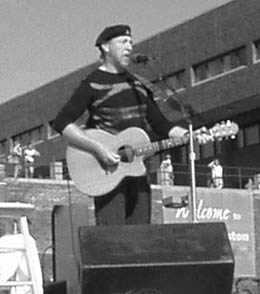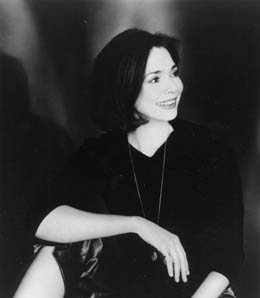The Boston Folk Festival culminated on Sunday evening with back-to-back performances by two Folk music powerhouses: Richard Thompson and Nanci Griffith.
At first, it struck me as if the Festival organizers were putting all their eggs in one basket by pairing Thompson and Griffith like this(each alone has a strong enough fan base to draw a huge crowd). The two have such different styles as to make for a jarring combination. Not to mention the risk in placing one before the other of alienating either performer’s devoted followers.
However, it turns out there was a good reason for the set-up. Apparently, Griffith’s manager had scheduled her for two performances on the same day (Saturday); not necessarily an impossible undertaking, except that the first of these performances was in Alaska. So Griffith was moved to the headline spot on Sunday, which Thompson, presumably, was originally supposed to fill. Hopefully, this explanation will be enough to satisfy any confused or upset fans. Now that that’s straightened out, I’ll move on to the performances.
Richard Thompson stepped onto the main stage in the late afternoon like an outlaw poet, alone and clad in black, brandishing an acoustic guitar. He launched into a tight set that pulled no punches, and each punch landed where it counts. The crowd was hooked from the start; Thompson is an incredibly captivating performer, with a seething tension just barely kept in check behind a buffer of eloquence.
He is also a craftsman of elegant and thoughtful songs-and that goes for music as well as lyrics; in his work, the two are beautifully paired. His lyrics are literate, spiked with sharp turns of speech and well-chiseled images. He is a gifted writer who is unafraid of being blunt, even brutal, yet always remains a poet. With one foot in the formal English folk tradition and one foot in rock and roll, Thompson is the romantic troubadour redone as critic of the modern age. He belongs in the company of such vitriolic and genius songwriter-poets as Bob Dylan and Elvis Costello.
His playing is edgy, original, a ballsy mix of styles, rhythms and dramatically employed dissonance; he is a strong and versatile guitarist. His vocal style is as intense and expressive as his playing; he has an emotive voice capable of conveying the heart of a song through its inflection. His songs are dark, aggressive with a sober wit, but they can also be tender, introspective. They are never lightweight or weak.
Thompson attacked each song in the set with a voracious passion, which even when restrained, was powerful. He is the kind of performer who can get an audience screaming and clapping or stun them into silence with moments of heartbreaking melodic beauty.
While firmly rooted in the Folk tradition, Thompson also seems influenced by a Rock aesthetic. Midway through his set, he was joined on-stage by a drummer who, on a minimal kit, added a further edge to the songs, punctuating Thompson’s terse rhythms and explosive solos. The sound of some of these songs verged on punk rock territory, which makes sense. After all, modern music genres like Punk and Skiffle have roots in the same working class background as Folk. As a form that serves to motivate, unite, and give voice to the people, Punk is really just a different kind of Folk music. In Thompson’s work, the two approaches inform each other in a truly affecting way.
To call Thompson Folk Royalty wouldn’t be much of a stretch. There is something royal in his commanding and elegant presence; from beginning to end, while Thompson played, he ruled the Festival. Long live King Richard!
After Thompson left the stage, there was a long break before Griffith’s set. Maybe this was to let the audience regain its strength after his emotionally intense performance. As the sun began to set, Griffith at last took the stage accompanied by her Blue Moon Orchestra. The performance was the last of an epic 15 month tour for Griffith and the band. The Orchestra was a stripped down version of the touring band: a keyboardist, a drummer, an acoustic bass player, and Griffith up front on guitar.
It was refreshing to hear a full band after a weekend of predominantly solo acoustic performances. The band played with energy and a sense of space that lent a breezy, loose feel to the songs. Griffith’s voice was strong and lovely, high and clear with just a touch of twang.
This was definitely the most produced of the Festival’s performances, a little slick sounding actually. Griffith has been traveling extensively in Vietnam and Cambodia recently as part of her involvement with the Campaign for a Landmine Free World, a cause which she encouraged the audience to support. Towards the end of the set, Griffith introduced some odd synth-created sounds that, presumably, were meant to convey a sense of “world music,” but were more distracting than atmospheric.
I am a fan of Griffith’s recorded work, particularly her early stuff (which is adamantly in the country-folk vein), but I have to admit I found her performance disappointing. Over the past few years, Griffith has adopted a more mainstream pop stance. It is hard to say whether this is a stance that suits her. On the one hand, the introduction of the pop element at its best put a fresh spin on her work. On the other, at its worst, it diluted the rich craftsmanship that Griffith normally brings to her songs. Occasionally, Griffith dipped into Billy Joel territory, a baffling misstep from a performer who is perfectly capable of writing songs as good as any going in the current country and folk scene.
A handful of songs stood as impressive examples of Griffith’s songwriting talent; these were mostly older songs, which retained a strong country ethic. Unfortunately, the bulk of the set veered too far from the folk tradition that Griffith came out of and in which she excels. Perhaps it was the result of being burnt out from a grueling tour, or of being deprived of the sound of the full orchestra, but the effect of the performance was somewhat lackluster. I don’t know about the rest crowd, but when Griffith launched into a cover of “From A Distance”, she lost me.
Almost. Griffith redeemed herself at the end of the show with a rousing rendition of “Last Train Home”, an ironic “cry in your beer” tribute to several of Griffith’s ex-lovers. The song was good old-fashioned country stomp that showed how brightly Griffith can shine in the right setting. I wish there had more like this in this set. When she sticks to what she’s good at-honest and inventive country-folk tunes-Griffith provides ample proof of her right to be included among the best Folk artists of her generation.


